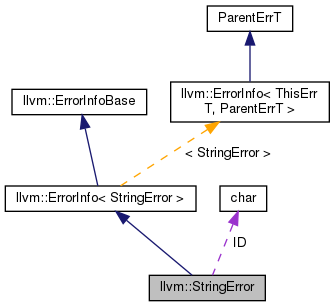This class wraps a string in an Error. More...
#include "llvm/Support/Error.h"


Public Member Functions | |
| StringError (std::error_code EC, const Twine &S=Twine()) | |
| StringError (const Twine &S, std::error_code EC) | |
| void | log (raw_ostream &OS) const override |
| Print an error message to an output stream. More... | |
| std::error_code | convertToErrorCode () const override |
| Convert this error to a std::error_code. More... | |
| const std::string & | getMessage () const |
 Public Member Functions inherited from llvm::ErrorInfo< StringError > Public Member Functions inherited from llvm::ErrorInfo< StringError > | |
| const void * | dynamicClassID () const override |
| bool | isA (const void *const ClassID) const override |
 Public Member Functions inherited from llvm::ErrorInfoBase Public Member Functions inherited from llvm::ErrorInfoBase | |
| virtual | ~ErrorInfoBase ()=default |
| virtual std::string | message () const |
| Return the error message as a string. More... | |
| template<typename ErrorInfoT > | |
| bool | isA () const |
Static Public Attributes | |
| static char | ID = 0 |
Additional Inherited Members | |
 Static Public Member Functions inherited from llvm::ErrorInfo< StringError > Static Public Member Functions inherited from llvm::ErrorInfo< StringError > | |
| static const void * | classID () |
 Static Public Member Functions inherited from llvm::ErrorInfoBase Static Public Member Functions inherited from llvm::ErrorInfoBase | |
| static const void * | classID () |
Detailed Description
This class wraps a string in an Error.
StringError is useful in cases where the client is not expected to be able to consume the specific error message programmatically (for example, if the error message is to be presented to the user).
StringError can also be used when additional information is to be printed along with a error_code message. Depending on the constructor called, this class can either display:
- the error_code message (ECError behavior)
- a string
- the error_code message and a string
These behaviors are useful when subtyping is required; for example, when a specific library needs an explicit error type. In the example below, PDBError is derived from StringError:
Constructor & Destructor Documentation
◆ StringError() [1/2]
◆ StringError() [2/2]
Member Function Documentation
◆ convertToErrorCode()
|
overridevirtual |
Convert this error to a std::error_code.
This is a temporary crutch to enable interaction with code still using std::error_code. It will be removed in the future.
Implements llvm::ErrorInfoBase.
◆ getMessage()
|
inline |
◆ log()
|
overridevirtual |
Print an error message to an output stream.
Implements llvm::ErrorInfoBase.
Member Data Documentation
◆ ID
The documentation for this class was generated from the following files:
 1.8.13
1.8.13